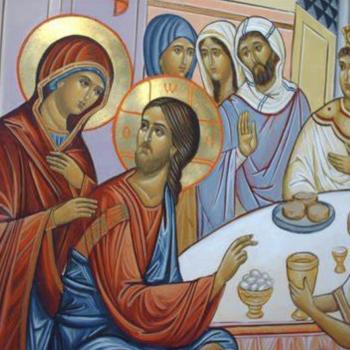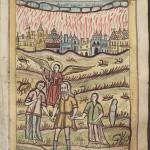Why would a Protestant want to be part of Sick Pilgrim?
There are basically two ways of thinking about what it means to be a Protestant Christian.
One road is that of ascetic severity: if it’s not in the Bible or a given book of confessions, then it has to be thrown out. Calvinist strands in particular have tended to expel both extra-biblical Christian lore and the sensory engagement that has characterized popular piety – icons, incense, Marian devotion, etc. This is Christianity as a narrow, stark trail, with fear of superstition on all sides.
The other path is that of the wanderer throughout the church and its labyrinthine highways and byways – east, west, Geneva, Wittenberg, Rome, Constantinople, Azuza Street. If the danger of the first road is throwing the baby out with the bathwater, then the danger of the second road is tourism – superficial engagement with the surface beauty of a given tradition without taking the time to go deep into the rhythms of discipleship that forms its people. Tourists have no requirement for fidelity, or solidarity with the dwellers in the village.
Paul Tillich’s three-volume systematic theology is often derided as the height of white male theological pretension to capture the faith in the arrogance of intellectualized systems. But a close reading of that text reveals a kind of core sadness, a dislocation, at the heart of its method. Tillich distinguishes between “Catholic substance” and “Protestant principle,” with the argument that faith needs the thick accretion over centuries of ritual, liturgy, doctrine, and so on – that is the Catholic substance. He goes on to argue, though, that Catholic substance always needs to be balanced with the willingness to interrogate the symbols and rituals of belief to see if they still convey the gospel in a given time and place – hence “Protestant principle.” To be a person of faith is to cling deeply to substance even as one knows that, within the streams of history, things of faith are dynamic, mutable, and constantly changing. Dynamic discipleship implies overtones of existential homelessness; to live there is itself faith. It is not tourism, it is pilgrimage– the deeper one goes, the more one is sent out, and vice versa.
Can interplay of rootedness and dislocation, this “oscillation” as Friedrich Schleiermacher would call it, be a home? Can one commit to faith in the disruption of faith? Can one go deeply into a tradition only to discover that the very depths send one deeper into ambiguity rather than the fragile clarity that flees grey areas?
Part of the genius of Sick Pilgrim, and perhaps why a Protestant like myself is attracted to it, is that the gambit that one can make one’s home in faith’s disruption is also a gamble on people, and on God – can one trust that the dynamic movement that is carrying us home truly is of God, and is not a road to ruin? Can one trust one’s traveling companions enough to act as though, even when the substance of faith changes, the people that God calls together are worthy of loyalty? Can one have solidarity among the dispossessed and have that solidarity be its own form of bond, however diffuse?
I hated Bunyon’s Pilgrim’s Progress the first time I read it – not only did I find its imagery too on the nose, but I thought that it was describing the height of Protestant individualism; a seeminly arrogant “real” Christian shopping his way through options and judgmentally dismissing as insufficiently serious those whom he came upon. But when I said this in class, my wise teacher corrected me – Bunyon, she says, is describing the search for true community, not romanticizing the solitary path. It is restlessness towards the goal that makes community provisional for him, and does not allow him to tarry with those who cannot share the power of the lure – or the goad – that moves him forward.
Solidarity among the dispossessed, among those whose principled drive into substance breaks the symbols that used to work and sends one forth into uncertainty, is by no means foreign to the Christian spirit. The very incarnation speaks to God’s ongoing refusal to let divinity be calmly untainted by the contingencies of flesh and history, by the uncertainties that come with having bodies that fear. If Philippians is to be believed, incarnation itself is kenotic dislocation, and to the extent that Paul is to be believed that the body of Christ on earth recapitulates the dynamics of Jesus’ body, then the community in its very thickness must uproot as well as ground.
The gospel of Mark speaks of faith as a journey; the gospel of John speaks more of abiding. Can one abide in journey? Can one be led into being settled? These are questions that lure. They lure me, anyway.
*****
 Robert Saler is a new regular contributor to Sick Pilgrim. He is associate dean and research professor of Lutheran studies at Christian Theological Seminary in Indianapolis, IN.
Robert Saler is a new regular contributor to Sick Pilgrim. He is associate dean and research professor of Lutheran studies at Christian Theological Seminary in Indianapolis, IN.

















